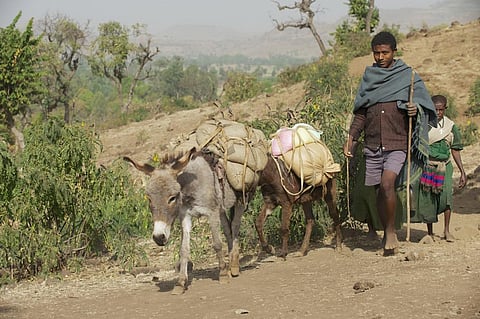

A historic ban on the trade in donkey skin has been agreed upon by the African heads of state. This agreement, announced on the concluding day of the African Union summit in Ethiopia, outlawed killing of donkeys in the African continent for their skin.
This is a significant outcome following the Dar es Salaam declaration adopted at the first AU-IBAR Pan-African Donkey Conference in December 2022.
The statement acknowledged the socioeconomic significance of donkeys in Africa. It had demanded for an African Union Commission (AUC) resolution to be passed in favour of a 15-year ban on the commercial killing of donkeys for their skin. Other demands included the creation of an Africa donkey strategy for donkey production and productivity, and the inclusion of donkeys in the global development agenda.
In September 2020, the pan-African animal conference, also, had urged African governments to take immediate action to protect donkeys, including the creation and successful application of laws and policies that will support them, and to outlaw the sale of donkeys and the trade in their skin, as these activities pose a major socioeconomic threat to communities that depend on them.
In June 2021, a ministerial meeting during the ECOWAS Regional Donkey Skin Trade Conference also raised concerns over the devastating impact of the donkey skin trade on donkey populations and the communities across Africa.
The landmark moratorium on skin trade in donkeys agreed upon at the AU summit has been welcomed by wildlife conservationists such as Marianne Steele, chief executive, The Donkey Sanctuary.
“This agreement from leaders of the African Union strikes at the heart of the brutal skin trade. It’s our hope that this decision will act as a catalyst for the rest of the world to act now, to not just save our donkey populations but to actively recognise their value and protect them properly,” said Steele in her statement.
Donkey skin is used to make the traditional Chinese medicine ejiao. It is in constant demand, fueling a global trade that is vicious, unsustainable and opportunistic.
In five years between 2016 and 2021, ejiao production is estimated to have increased by 160 per cent, the Donkey Sanctuary estimated in a paper Donkeys in global trade released this year.
The ejiao industry now requires a minimum of 5.9 million donkey skin annually to keep up with the latest Chinese demand, the organisation noted.
The demand for donkey skin reduced the donkey population in China from 11 million in 1992 to just under two million. Efforts to intensively farm donkeys locally failed to address this demand.
So, the demand for ejiao, a gelatine manufactured by boiling donkey skin, is met primarily by imported skin sourced from South America and Africa.
With increasing demand, at least 6.8 million donkeys are projected to be killed every year in 2027, the Donkey sanctuary estimated.
Africa is particularly affected by this, as it is home to over two-thirds of the 53 million donkeys estimated to exist worldwide. Farmers who depend on donkeys for their livelihoods have seen theft and cruel treatment of animals as a result of the increased demand.
The countries where donkeys are being traded illegally for their skin include Ghana, Nigeria, Botswana, Burkina Faso, Mali, Niger, Senegal, Uganda, Ethiopia, South Sudan, Tanzania, Kenya and Egypt.
The number of donkeys in Africa has decreased dramatically over the past 10 years.
For example in Kenya, the population of donkeys decreased by 800,000 in about seven years. In 2016, the country had 1.8 million donkeys, which reduced to around 1 million in 2023, according to a report by the Association of Donkey Owners of Kenya (ADOK). This translates to a decrease in the donkey’s population by around 44 per cent in just seven years.
“If the exploitation of donkeys were to continue at the rate we had been seeing, in another three to six years, donkeys could be joining rhino and elephants as an endangered species in Africa,” stated Calvin Solomon Onyango, director of The Donkey Sanctuary in Kenya.
The population of donkeys in Botswana declined from 493,000 in 2003 to 125,000 in 2021.
The historic pan-African agreement will protect 33 million donkeys that are on the continent from being stolen, trafficked and killed. This will also save tens of thousands of African communities who depend on donkeys for their well-being and means of subsistence.
Donkeys are critical to millions of people and the global trade in donkey skin undermines efforts to achieve at least nine of the 17 United Nations-mandated sustainable development goals. These include the goal to end poverty (SDG1), since equid ownership represents the only viable escape from extreme poverty.
For example, two-thirds of donkey owners in Mali reported a monthly income of more than $167, through the work of their donkeys, above the average per capita income. For rural households in Ethiopia, working equids contribute an average of 14 per cent of family income.
This landmark decision needs to be implemented and enforced by every country that makes up the African Union, stated Otieno Mtula, regional campaigns and advocacy manager for The Donkey Sanctuary.
Brazil is also likely to impose a ban on illegal donkey skin trade. This may disrupt the supply chain and the ejiao industry in China, experts predicted.